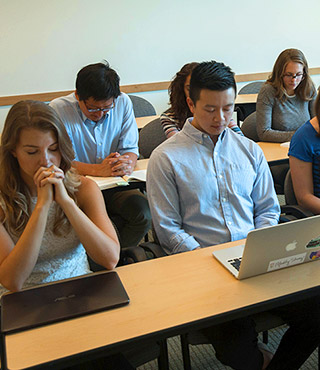Special Notification
- No application fee required.
- This program is open only to applicants residing within the United States.
- All Criminal Justice MS courses must be taken on campus.
Program Description
The combined MSW and MS in Criminal Justice dual degree is a 90-unit program emphasizing behavioral health interventions to address the prevention, early intervention, treatment, and rehabilitation needs of persons at risk for or who have already been incarcerated. Students pursuing this degree learn to work with multiple systems, including social services, law enforcement, courts, public defenders, probation, and parole to support at-risk, incarcerated, and recently-released inmates. Students learn the importance of an integrated approach to behavioral health that supports restorative justice and community reintegration.
Program Length
2-, 3-, and 4-year options
Possible Careers
Forensic Mental Health Social Worker, Clinical Social Worker, Psychiatric Social Worker, Medical Social Worker, Child and Family Social Worker, Geriatric Social Worker, Community Social Worker, Administrator, Research Social Worker, and Social Work Educator. Many Forensic Social Workers work in settings such as the court system, detention centers, forensic inpatient programs, and forensic outpatient behavioral health systems.
Admissions Requirements
1. A four-year baccalaureate degree (or its equivalent) from an accredited college or university.
2. The MSW/MS in Criminal Justice curriculum is built on a liberal arts perspective. Individual applicants whose undergraduate degree does not reflect this perspective may be asked to enroll in additional courses.
3. Applicants must submit a completed application, including a personal statement; application fee; all college and/or university transcripts; and at least three letters of recommendation—preferably one of which is from an academic source and one from a work supervisor. All students who are working fulltime must also submit a letter from their agency director acknowledging support in completing the practicum and educational requirements of the MSW program.
4. Applicants must meet the minimum academic and professional compatibility criteria established by the program. These criteria include:
• A cumulative undergraduate grade point average of 3.0 or above (on a 4.0 scale). Applicants with lower grade point averages will be considered if the last 45-quarter credits (30 semester units) of non-field practica course work shows significant improvement or if they have additional attributes that demonstrate preparedness and an appropriate fit for graduate social work education. Work and volunteer experiences must be verified by employer/supervisor statements on official agency stationery. Further consideration will also be given to individuals who provide evidence of additional graduate coursework, certifications, and/or training that illustrate preliminary preparation for a career in social work. Students who are admitted to the Social Work Program with a cumulative G.P.A. below 3.0 may be required to participate in individualized academic assessment and a targeted learning assistance program.
• Demonstration, through the application and interview processes, of compatibility with the profession of social work, ability to develop and nurture interpersonal relationships, communication skills, self-awareness, professional comportment, critical thinking skills, fit with the mission and values of Loma Linda University and the Department of Social Work and Social Ecology, and the capacity to successfully complete the Master of Social Work curriculum.
Prerequisites
A four-year baccalaureate degree (or its equivalent) from an accredited college or university. Individual applicants whose undergraduate degree does not reflect a liberal arts perspective may be asked to enroll in additional courses.
Discipline Accrediting Agency
The Master of Social Work program is fully accredited by the Council of Social Work Education (CSWE) to provide master's degree-level education, with the next reaffirmation to be completed in 2025. There is no discipline specific accrediting body for the Criminal Justice program.
State Accrediting Agency
Loma Linda University is regionally accredited by the WSCUC (Western Association of Schools and Colleges [WASC] Senior College and University Commission).Notes
Please contact the department at sowk@llu.edu for information on the cost of attendance for this dual degree program.- Estimated amounts are for the academic year specified only. Amounts are based on full-time attendance for the number of months enrolled per academic year. International students need to calculate 12 months of living expenses based on these amounts.
- Amounts are expected to increase each year consistent with inflation in the professional education sector.
- To qualify for financial aid, most students must be enrolled at least half time in an aid eligible program and be taking degree requirements. Half time is 6 units in a quarter for undergraduate programs and 4 units in a quarter for graduate programs.


